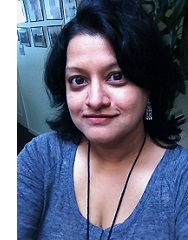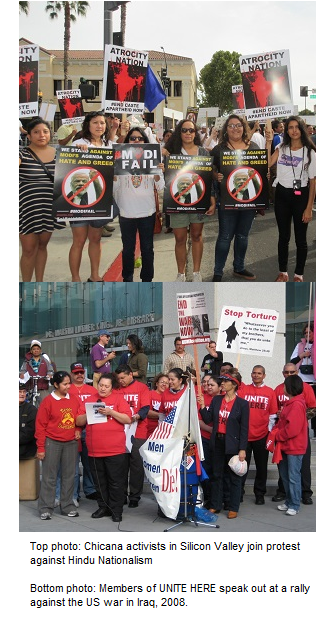


Anu Mandavilli grew up in India and came
to the U.S. for graduate school. She has been involved in social
justice work with community organizations, social movements, and
labor unions in India and the U.S. She was part of the Mining
Zone Peoples’ Solidarity Group research collective, working
with communities in Orissa, India, fighting land grabs by steel
giant POSCO. She has worked on campaigns opposing Hindu nationalism,
demanding corporate accountability with Friends
of South Asia and the Free Binayak Sen campaign. She lives in
the SF Bay Area, and locally, she works with the San
Jose Peace and Justice Center and was part of the Coalition
for Justice and Accountability that works towards civilian oversight
of the SJPD.
Anu is also sharing her social justice experiences as a Core
Organizer with Bay
Area Solidarity Summer (BASS). Created in 2011, BASS mentors
the next generation of South Asian organizers. In addition to
workshops covering topics from climate injustice to racial violence,
it also gives participants the opportunity to connect with local
activists and BASS alumni.
What first drew you to social justice work?
I went to school in the city of Hyderabad, India, which has seen a lot of politically instigated violence between the city's Hindu & Muslim communities. While the violence was often explained away as an inevitable consequence of religious differences, and/or blamed on the Muslim community, I was fortunate to have amazing teachers that challenged us to think about issues of power, the values of pluralism and secularism, and how to uphold them in a multi-religious, multi-cultural and multi-lingual democracy like India. I also witnessed social movements like the ‘Narmada Bachao Andolan’ which raised crucial questions about environmental justice and democratic self-determination. While such influences led me to progressive politics, the organizing skills required to realize those politics on the ground are something I believe I will always continue to learn!
How did the idea for BASS come about and how did you become an organizer?
BASS is modeled after Youth Solidarity Summer (which ran in NYC from 1997 to 2007), and Organizing Youth! (which ran in 2004 & 2005 in the SF Bay Area). Like YSS & OY!, BASS aims to connect South Asian-American youth to the history of radical politics and the struggles for social justice within their communities.
I was involved in the very first BASS in 2011 as a trainer, and became a member of the core organizing team in 2014. Like the other members of the core team, I came to BASS through my experience of organizing in the South Asian immigrant community. Not only does that experience help me understand the need for a space like BASS, it also underlines for me the questions such a space must deal with including those related to model minority rhetoric, islamophobia, Hindu nationalism, casteist discrimination, etc.
What has been the most eye-opening thing you have learned while working at BASS?
A key issue we address at BASS is the importance of Black-Brown solidarity. We discuss the shared histories of discrimination, and the debt that Asian-Americans owe the African-American community for their role in the civil rights movement which won fundamental rights and protections for all people of color. Without wins such as the Brown vs. Board of Education decision, the voting rights act, affirmative action, etc. the trajectory of South Asians in America would have been very different indeed!
A second part of this discussion is anti-Blackness in South Asian-American communities, and how it is that immigrants who might never have met a Black person in their countries of origin nevertheless practice anti-Blackness in the US. As someone that did not grow up in the US, I’ve learned so much from listening to BASS participants’ stories about how they, as young brown people, come to understand their place in the US racial hierarchy. I deeply appreciate the insight, the candor, and the vulnerability the participants have brought to our discussions of how anti-Blackness presents itself within South Asian immigrant communities including through the practice of casteism, colorism, etc.
What resources would you recommend for someone who wants to get involved, but doesn’t have access to a program like BASS in their area?
Today, the internet, and social media in particular, have made it so much easier to find other like-minded people with whom one can organize! But the first step is to be clear about the particular issue that moves you, the situation that you’d like to change, or the injustice that you’d like to address. If you are a student, then certainly your school/ university could help you reach out to the relevant groups/ individuals. BASS organizers are connected to various social justice organizations and activists across the US, including the organizers of other BASS-like programs such as CYDR, ECSS, SAHYU, etc. Please reach out to us via the BASS website and we are happy to connect you to other groups and individuals as appropriate!

Who or what do you look to for inspiration? I find inspiration everyday in stories of people organizing for justice, and standing up in solidarity with others’ struggles. In 2008, it was powerful for me to see hotel workers in San Jose marching to end the US war against Iraq, even as they were themselves fighting for union representation and better working conditions. In 2015, I was moved when allies from the Chicana feminist group MAIZ joined the Indian diaspora’s protest in Silicon Valley against Hindu nationalist violence in India. Within the Indian-American community, I deeply appreciate Ambedkar King Study Circle whose work is rooted in an intersectional analysis of caste and class.
Is there one piece of advice that you have found to be the most helpful?
This is not advice that was given to me personally, but rather an exhortation from the great labor organizer Cesar Chavez: “To bring about change, three things are important: public action, public action, and public action!” The twin emphasis in BASS's programming where thematic discussions as well as training in concrete organizing skills are given equal space is reflective of our belief in public action.
What is something one should never forget while being an activist?
I find it deeply
inspiring and empowering to remember that wherever there is
oppression, there has always been resistance, and that I am part of
a much longer and greater history of the fight for equality and
justice. In those moments when one might be faced with a setback in
a campaign, it is important to remember this long history, and then
to gather the energy to re-strategize for a win!
_____________________
Applications for at Bay Area Solidarity Summer (BASS) Summer 2021
(Aug 5 to 9) can be found here.